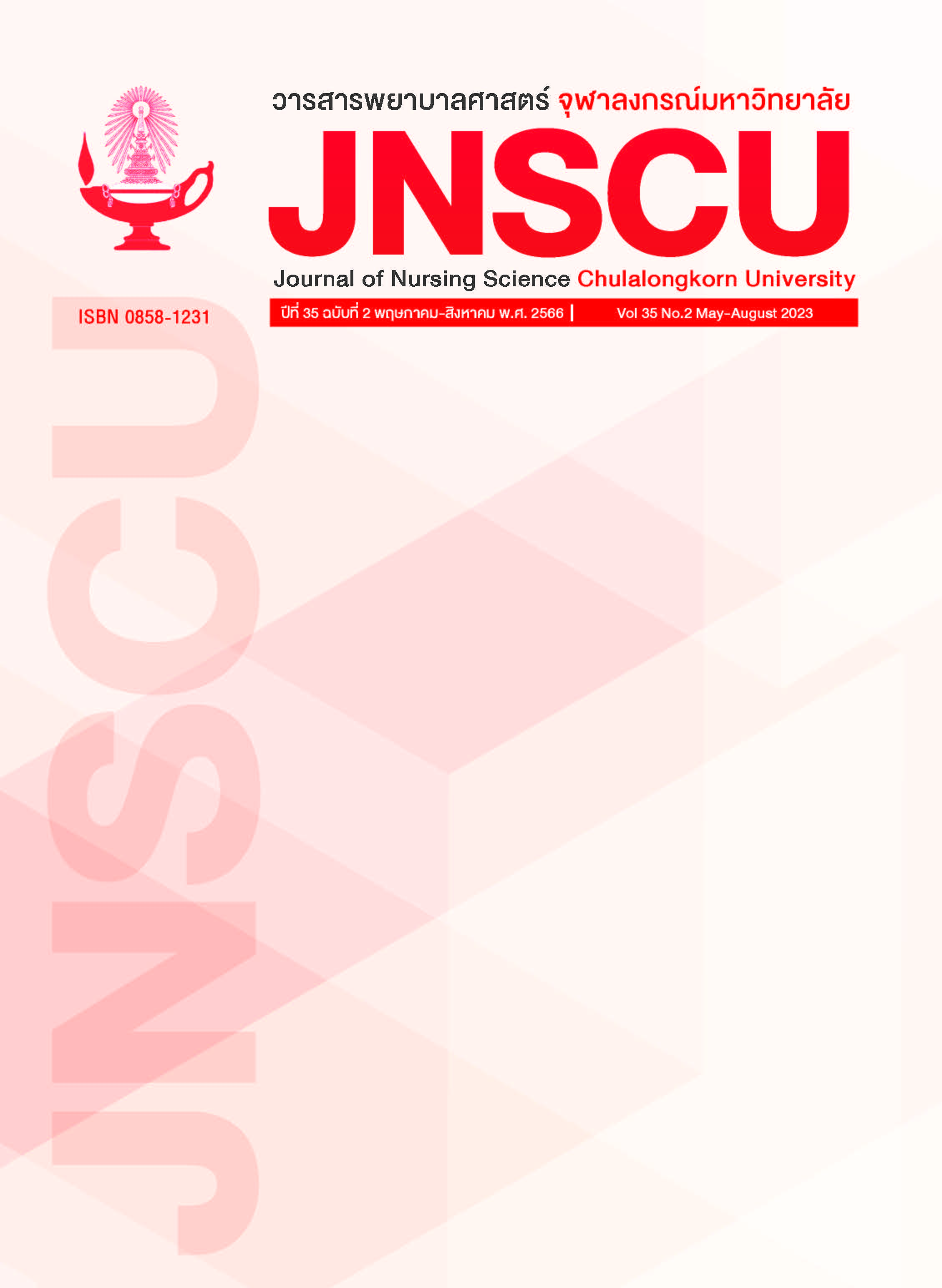Effectiveness of Stroke Nurse Specialist Led-transitional Care Program Combined with Tele-nursing among the first Episode Ischemic Stroke Patients and Primary Care-Givers
Main Article Content
Abstract
Objective: This study aims to assess the effect of stroke nurse specialist led-transitional care program combined with Tele-nursing, on the Activities of Daily Living in the first episode ischemic stroke patients on the discharge day, 1month post-discharge, and 3months post-discharge. Additionally, it aims to evaluate readiness of primary care-givers on 3months post-discharge.
Design: Randomized controlled experimental research and repeated measurements
Methods: Group of patients and caregivers of first-time ischemic stroke patients randomly assigned 32 pairs to the experimental group and 30 pairs to the control group. The experimental group received a stroke nurse specialist led-transitional care program combined with Tele-nursing for a period of 3 months. The control group received nursing care for ischemic stroke patients as usual while in the hospital. The tools used to collect data include: 1) Assessment of activities daily of living (ADLs score) in patient sample and 2) caregiver readiness assessment form in care-giver sample. Cronbach's alpha coefficient was 0.92 and 0.94, respectively. Data were analyzed using descriptive statistics, One-way repeated measure ANOVA, and independent t-test, with the statistical significance level set at .05
Results: At the three-month post-discharge, the experimental group had a mean score of ADLs significantly higher than the control group at the .05 level, and after the experiment between the experimental group and the control group. There was a significant higher in the mean readiness scores of primary care-givers for the first episode ischemic stroke patients at the .05 level.
Article Details

This work is licensed under a Creative Commons Attribution-NonCommercial-NoDerivatives 4.0 International License.
ลิขสิทธิ์ของบทความที่ตีพิมพ์เป็นของวารสารพยาบาลศาสตร์ จุฬาลงกรณ์มหาวิทยาลัย ทั้งฉบับตีพิมพ์เป็นรูปเล่มและเอกสารออนไลน์
References
Department of Desease Control, Division of Non Communicble Disease [Internet]. Number and inpatient rate in 2016 - 2018 (hypertension, diabetes, coronary artery disease, cerebrovascular disease, COPD); 2019; Available from: http://www.thaincd.com/2016/mission/documents-detail.php?id=13684&tid= 32&gid=1-020. [In Thai].
Somsak T. Stroke incidence in Thailand. Thai journal of Neurology. 2022;39(2):39-46. [In Thai]
Tooth L, McKenna K, Barnett A, Prescott C, Murphy S. Caregiver burden, time spent caring and health status in the first 12 months following stroke. Brain Injury. 2005;19(12):963-74.
Zhou J, Liu F, Zhou M, Long J, Zha F, Chen M, et al. Functional status and its related factors among stroke survivors in rehabilitation departments of hospitals in Shenzhen, China: a cross-sectional study. BMC Neurology. 2022;22(1):173.
Kimura Y, Ohji S, Ishiyama D, Nishio N, Otobe Y, Suzuki M, et al. Factors associated with functional recovery in Japanese patients with convalescent stroke stratified by age: a multicenter observational study. International Journal of Rehabilitation Research. 2019;42(3):249-55.
Boontarika M, Siriphan S. Selected factors related to physical functional ability among stroke older persons. Journal of Nursing Science Chulalongkorn University. 2019;31(3):87-100. [In Thai].
Narongkorn C, Nichapat M. The effects of family empowerment program on knowledge and skills in caring of patients with cardiovascular disease. Journal of Nursing Science Chulalongkorn University. 2020;32(3):1-14. [In Thai].
Chalermwannapong S, Panuthai S, Srisuphan W, Panya P, Ostwald SK. Effects of the transitional care program on functional ability and quality of life of stroke survivors. CMU J Nat Sci. 2010;9(1):49-66. [In Thai].
Nuntakarn P, Yupapin S, Supreeda M, Sirirat L. Effects of a transitional care program for stroke patients and family caregivers on caregiver’s preparedness, stress, adaptation, and satisfaction. Rama Nurs J. 2016;22(1):65-80. [In Thai].
Meleis AI. Transitions theory: Middle range and situation specific theories in nursing research and practice. New York: Springer; 2010. 664p.
Supreeda M, Yupapin S, Sirirat L. Effectiveness of transitional care program for stroke patients and family caregivers from hospital to home. Journal of Public Health Nursing. 2016;30(3):84-101. [In Thai].
Supattra P, Sriwanna W, Niramai M, Waraporn K. Effectiveness of transitional care program on activities of daily living and quality of life among elderly with stroke at chiang mai neurological hospital. Journal of Health Science. 2018;27(3): 500-9. [In Thai].
Condon C, Lycan S, Duncan P, Bushnell C. Reducing readmissions after stroke with a structured nurse practitioner/registered nurse transitional stroke program. Stroke. 2016;47(6):1599-604.
Cohen J. Statistical power analysis for the behavioral sciences (2nd ed). Hillsdale, NJ:Lawrence Eribaum Associates, Publishers; 1988:579p
Cohen J. Statistical power analysis for the behavioral sciences. New York: Academic press; 1988. 567p.
Sutthichai J. Principles of geriatric medicine. Bangkok: Chulalongkorn University Printing House; 1999. [In Thai].
Virapun W. Development of the thai family care inventory [dissertation]. [Oregon]: Oregon Health & Science University; 2002. 261p.
Wineeta P, Piyanuch J, Aporntip B. Effects of an supportive-educative nursing program on caregivers’ caring capabilities and abilities to perform activities of daily living of muslim patients with stroke. Rama Nurs J. 2021;27(3):343-59. [In Thai].
Wirarat N. Effects of a hospital-to-home transitional care program on activities of daily living, patients’ complications, and self-management ability of caregivers. Journal of Nursing and Public Health Research. 2022;2(3):57-70. [In Thai].

